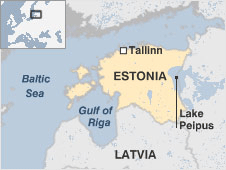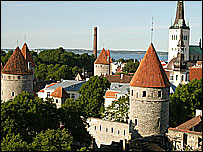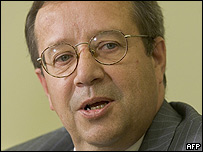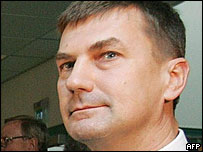Generic Medicines
Taj Pharma is the largest generic pharmaceutical company in India. We hold top positions in different established markets worldwide generics markets..
A small and heavily forested country Estonia is the most northerly of the three former Soviet Baltic republics.
 |
Not much more than a decade after it regained its independence following the collapse of the USSR the republic was welcomed as an EU member in May 2004. The move came just weeks after it joined Nato.
These historic developments would have been extremely hard to imagine in not-so-distant Soviet times.
 Tallinn: The Capital's long history is evident in its old town
|
Estonia was part of the Russian empire until 1918 when it proclaimed its independence. Russia recognised it as an independent state under the 1920 Treaty of Tartu.
During the two decades that followed it tried to assert its identity as a nation squeezed between the rise of Nazism in Germany and the dominion of Stalin in the USSR.
After a pact between Hitler and Stalin Soviet troops arrived in 1940 and Estonia was absorbed into the Soviet Union. Nazi forces pushed the Soviets out in 1941 but the Red Army returned in 1944 and remained for half a century.
The rapidly expanding Soviet planned economy brought hundreds of thousands of Soviet immigrants to Estonia causing widespread fear among Estonians that their national identity would eventually vanish.
Russians account for up to a third of the population.
The legacy of the Soviet years has left a mark which the country carries with it into its EU era: Many Russian-speakers complain of discrimination saying strict language laws make it hard to get jobs or citizenship without proficiency in Estonian. Some Russian-speakers who were born in Estonia are either unable or unwilling to become citizens because of the language requirements.
After a decade of negotiations Estonia and Russia signed a treaty defining the border between the two countries in May 2005. The Estonian parliament ratified it soon afterwards but only after it had introduced reference to Soviet occupation. Moscow reacted by pulling out of the treaty and saying talks would have to start afresh.
The Estonian language is closely related to Finnish but not to the languages of either of the other Baltic republics Latvia and Lithuania or to Russian. The country has unique traditions in folk song and verse traditions which have had to be strong to survive the many centuries of domination by foreign countries.
Estonia enjoyed an investment boom following EU accession but in 2008 its economy was badly hit by the global financial crisis.
With the economy expected to shrink by about 15 percent this year the government has adopted austerity measures in an effort to stay on course for euro entry in 2019.
President: Toomas Hendrik Ilves

President Toomas Hendrik Ilves |
Mr Ilves was sworn in as president in October 2006.
As head of state the president is supreme commander of the armed forces and represents Estonia abroad. However the role is mainly ceremonial.
The president is elected to a five-year term by MPs and local officials.
Prime minister: Andrus Ansip
Andrus Ansip is Estonia's first sitting prime minister to be re-elected since the country quit the Soviet Union in 1991.
He became prime minister in April 2005 and in March 2007 his centre-right Reform Party won parliamentary polls but with too small a margin to govern alone.
It went on to form a coalition with the conservative Pro Patria-Res Publica and the Social Democrats.
As the new government took office Mr Ansip outlined plans to cut taxes increase defence spending in line with pledges to Nato and to steer Estonia towards adopting the European single currency.

PM Andrus Ansip a former mayor of Tartu
|
He had aimed for eurozone membership in January 2007 but high inflation led the government to put back the target entry date.
In the run-up to the March 2007 poll Mr Ansip backed controversial legislation which paved the way for the removal of a controversial Red Army memorial in Tallinn. The law and the subsequent relocation of the statue sparked fury in Moscow.
Andrus Ansip was 48 when he became premier. He entered national politics in 2004 following a stint as mayor of Tartu Estonia's second city.
His first government which included the centre-left Centre Party and the centrist
People's Union was Estonia's eighth administration in 12 years.
Estonia's broadcasting industry grew significantly in the 1990s. It has attracted foreign media groups; the main privately-owned TVs are run by Swedish and Norwegian concerns.
Eesti Televisioon (ETV) and Eesti Raadio (ER) are public broadcasters. Take-up of cable TV is extensive; the offering includes stations in Finnish Swedish Russian and Latvian.
Estonia has a reputation for being at the cutting edge of technology. By December 2008 854000 Estonians - 65% of the population - were using the internet. The country held the world's first parliamentary "e-vote" in 2007.
The press
Television
Radio
News agency/internet
Novoeye Dnya - Russian-language portal
AFRICA | ASIA-PACIFIC | AMERICAS | EUROPE | MIDDLEEAST | SOUTHASIA
![]()
![]()
![]()
Mauritania Mauritius Morocco Mozambique Namibia Niger Nigeria Republic-of-congo Rwanda Sao-tome-and-principe Senegal Seychelles Sierra-leone Somalia South-africa Sudan Swaziland Tanzania The-gambia Togo Tunisia Uganda Australia Brunei Burma Cambodia China East-timor Fiji Indonesia Japan Kazakhstan Kiribati Kyrgyzstan Laos Malaysia Marshall-islands Micronesia Mongolia Nauru New-zealand North-korea Palau Papua-new-guinea Samoa Singapore Solomon-islands South-korea Taiwan Tajikistan Thailand The-philippines Tonga Turkmenistan Tuvalu Uzbekistan Vanuatu Vietnam Antigua-and-barbuda Belize Bolivia Brazil Canada Chile Colombia Costa-rica Cuba Dominica Dominican-republic Ecuador El-salvador Grenada Guatemala Guyana Haiti Honduras Jamaica Mexico Nicaragua St-kitts-and-nevis St-lucia Suriname Trinidad-and-tobago Uruguay Venezuela Albania Andorra Armenia Austria Azerbaijan Belarus Belgium Bosnia-hercegovina Bulgaria Croatia Cyprus Czech-republic Denmark Estonia Finland France Georgia Germany Greece Hungary Iceland Ireland Italy Latvia Liechtenstein Lithuania Luxembourg Macedonia Malta Moldova Monaco Montenegro Norway Poland Portugal Russia San-marino Serbia Slovakia Slovenia Spain Sweden Algeria Egypt Iran Iraq Israel-and-palestinian-territories Jordan Kuwait Lebanon Libya Mauritania Oman Saudi-arabia Sudan Syria Tunisia United-arab-emirates Yemen Afghanistan Bangladesh Bhutan India Nepal Pakistan Sri-Lanka The-Maldive